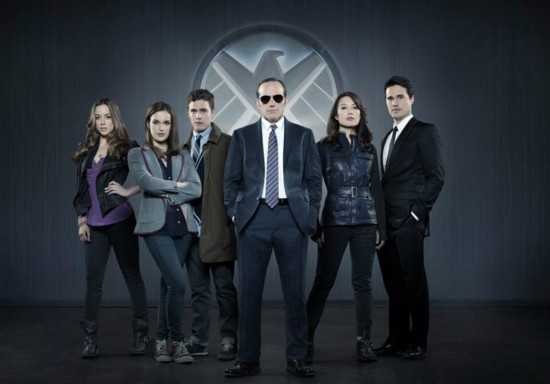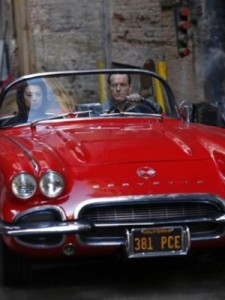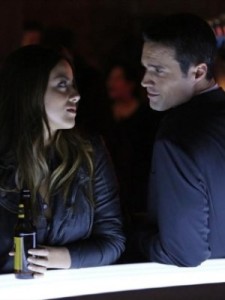 Marvel’s Agents of S.H.I.E.L.D debuted just like you’d think a TV series that tied into the Marvel Cinematic Universe would, with a 4.7 rating, 14 share, and 12.12 million viewers. However, as the series progressed, it became a case of diminishing returns. The most recent episode, which feature Jamie Alexander’s Sif character from the Thor films, could only garner half the pilot’s ratings (2.1/7, 5.99 million). Yet, this was seen as a good sign as it was an improvement over the previous episode, which earned a series low 1.8/6 with 5.46 million viewers. Granted, the show has anywhere from 3 to 4 millions people who watch the show on the DVR then next day, but when there are two MCU films in the top five all-time highest grossing films worldwide, having a TV tie-in not be able to win its time slot is a disappointment. And a quick search of the Internet will show you that criticism of the show from fans and professional critics alike increased as ratings decreased.
Marvel’s Agents of S.H.I.E.L.D debuted just like you’d think a TV series that tied into the Marvel Cinematic Universe would, with a 4.7 rating, 14 share, and 12.12 million viewers. However, as the series progressed, it became a case of diminishing returns. The most recent episode, which feature Jamie Alexander’s Sif character from the Thor films, could only garner half the pilot’s ratings (2.1/7, 5.99 million). Yet, this was seen as a good sign as it was an improvement over the previous episode, which earned a series low 1.8/6 with 5.46 million viewers. Granted, the show has anywhere from 3 to 4 millions people who watch the show on the DVR then next day, but when there are two MCU films in the top five all-time highest grossing films worldwide, having a TV tie-in not be able to win its time slot is a disappointment. And a quick search of the Internet will show you that criticism of the show from fans and professional critics alike increased as ratings decreased.
In an effort to correct this freefall, ABC is airing a special tonight that will mix behind-the-scenes sneak peeks at Marvel’s upcoming film slate with a healthy dose of promotion of the TV show. I’m sure the network hopes that reaffirming the ties the show has with the Marvel Cinematic Universe will bring back those lost viewers. But it might just be that tie, and the expectations that it brought, is what caused viewers to leave in droves.
 When AoS (as I will be calling the show from here on out) was announced, it raised a number of expectations in what would be the core audience for the show. In fans of the MCU films, it raised the expectation that the TV show would just be a Marvel film brought to the small screen, complete with big names and big budget special effects. Comic book fans expected that this would be another venue for their favorite characters to come to life with living, breathing actors. It turns out that neither group of the show’s core demographic got what it wanted, resulting in a testy and disenfranchised viewership. This made it almost impossible for the show to be taken on its own merits. Every flaw, every misstep was exacerbated by its disappointed viewership as further reason why the show’s creators got it wrong and why the show didn’t work.
When AoS (as I will be calling the show from here on out) was announced, it raised a number of expectations in what would be the core audience for the show. In fans of the MCU films, it raised the expectation that the TV show would just be a Marvel film brought to the small screen, complete with big names and big budget special effects. Comic book fans expected that this would be another venue for their favorite characters to come to life with living, breathing actors. It turns out that neither group of the show’s core demographic got what it wanted, resulting in a testy and disenfranchised viewership. This made it almost impossible for the show to be taken on its own merits. Every flaw, every misstep was exacerbated by its disappointed viewership as further reason why the show’s creators got it wrong and why the show didn’t work.
However, the question I asked myself is, “Are these expectations realistic?” The answer I found was, “No, and on the surface, yes.”
The most unrealistic expectation was that the films would transfer over to television exactly. This could be chalked up to fans simply not realizing the vast differences between film budgets and TV budgets. The Marvel films cost between $140 million to $225 million to make. The average TV show costs around $3 million to make. Even if AoS carries a slightly higher budget, it is still miles away from what goes into making a movie.
This means no Robert Downey Jr or Chris Hemsworth in a reoccurring role, no CGI characters, and no superpowers that would be cost prohibitive to portray on screen. This is why the series focus on the reasonably cheap adventures of S.H.I.E.L.D. agents and not, say, War Machine or Sentry.
Which isn’t to say that there couldn’t be more interplay between the film world and the TV show. This does sound silly when you consider that a driving plot point of the series so far–the Extremis virus–was also a main driving plot point of Iron Man 3. However, its connection to Thor: The Dark World was simply to dedicate a show to cleaning up after the fact. It would not have been hard to have Fitz and Simmons investigate a separate dimensional aperture breach similar to the one in the movie in an episode leading up to the release date (and work in a reason why S.H.I.E.L.D. was nowhere to be found when a big alien spaceship was tearing up an English city while they were at it) .
 Perhaps this is about to change. The current plot line focuses on Coulson losing his faith in the way S.H.I.E.L.D. does business, much like the sentiment Captain America expresses in the trailers for Captain America: Winter Soldier. Hopefully, the parallel is deliberate and is a sign of more synergy between the films and the TV series.
Perhaps this is about to change. The current plot line focuses on Coulson losing his faith in the way S.H.I.E.L.D. does business, much like the sentiment Captain America expresses in the trailers for Captain America: Winter Soldier. Hopefully, the parallel is deliberate and is a sign of more synergy between the films and the TV series.
What could very well be more puzzling to fans is why there are not more Marvel Comics guest stars, and when there are, they are of the ilk of Victoria Hand and John Garrett and not Crusher Creel or Carol Danvers. After all, Disney owns Marvel and ABC, so if Marvel owns the rights to a character, ABC should have free reign to them as well. The only thing stopping them would be the cost of bringing their powers to the big screen.
It would be nice if it worked out that way, but no. AoS only has access to characters that Marvel think doesn’t have a chance at film success. This is what Jed Whedon told HitFix before the series premiered:
You said before that whenever you want to use an established character, it’s a process; Marvel’s this big machine. Working with characters you’ve created, how much autonomy do you have to make this show? Or are there layers and layers of bureaucracy you’re going through to do everything?
Maurissa Tancharoen: There’s some rules, yeah.
Jed Whedon: There’s some. There are some rules, but part of the process of figuring this out has been finding out what those rules are and where we can live between them. We always talk about how vast the Marvel universe is, so you’re not very limited. Obviously if it’s a huge name, they’d probably flag it for a feature and we aren’t going to get him for one week of television. But there’s plenty of characters. We also can work the other way in terms of coming up with stories we want to tell and then asking Marvel, “Do you have a guy who does that thing that we’re talking about?”
Of course, it doesn’t help that the guys that Marvel gives them are small-timers like Scorch and Blizzard. Either way, it sounds like every Marvel character that AoS wants to use has to go through a vetting process with Marvel, because there is no set rules or list of characters they can use. Now it’s a little bit easier to understand why the show’s villains are characters like Ian Quinn and the the Clairvoyant–it’s easier for AoS to create characters from whole cloth than it is to go through an application process every time they want to bring in a recurring character. It also makes the introduction of Deathlok that much more special because that character was long in development for a feature film. Taking all this into consideration, it’s a wonder he’s appearing in the series at all.

So, while it would be nice if AoS used more characters from the Marvel Universe, it’s not really their fault–it’s Marvel’s. The process of getting Marvel characters into the show should be much clearer and easier.
I believe that the show was burdened with unfair expectations. Expectations that hampered the show getting a fair shot right from the start. Granted, if these expectations weren’t there, people might still find fault in the show (for me, it’s extremely hit or miss. When it hits, it hits big. When it misses, it’s painful to watch.) But the show was handicapped by the successful films that came before it. And that is something the creators can not fix.





An interesting article. I would argue though, that they could clear 50 second and third tier characters in a day if they wanted to. Just to make it seem like they were in the Marvel Universe. And there are tons of cheap super powers. super strong guys, guys who teleport, invisible guys, guys who make things burst into flames. Special effects you see on every show. Not to mention if you can find a demolished building you can have a set where the Hulk “was” 10 minutes ago. The problem is that the premise is that the show takes place… Read more »
MARVEL’S AGENTS OF S.H.I.E.L.D And The Tyranny Of Expectations http://t.co/g6Xu3hs1O4
William Gatevackes liked this on Facebook.
Richard Zeszotarski liked this on Facebook.
David Gallaher liked this on Facebook.
Jim Austin liked this on Facebook.
The writing definitely has issues which didn’t help matters either.
Michael Martin liked this on Facebook.